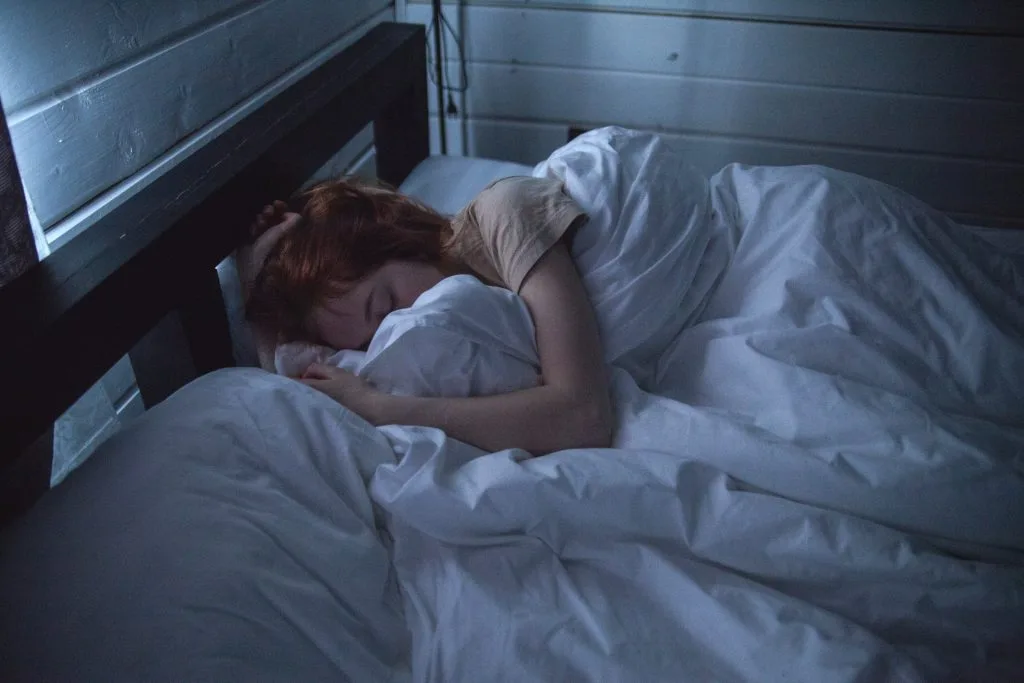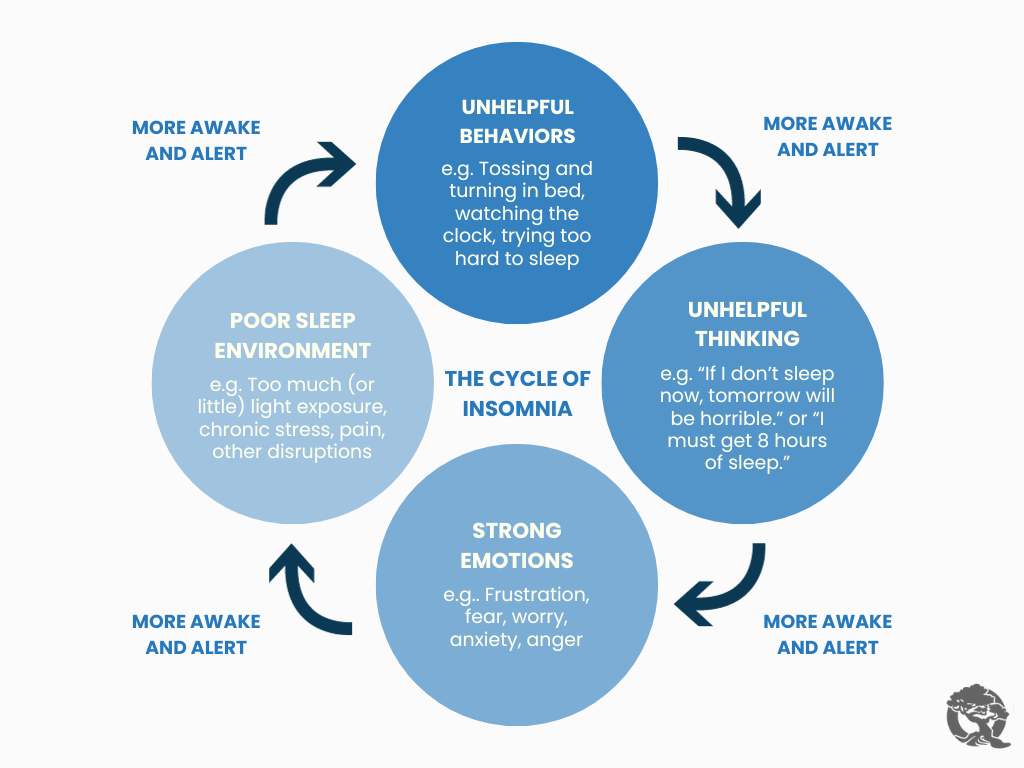Cognitive Behavioral Therapy for Insomnia (CBT-i)
Do You Struggle to Get Quality Sleep? Do you wake up feeling exhausted or worried about not being able to fall asleep? You’re not alone, and sleep therapy can help you untangle from insomnia and sleep well again.
Table of Contents
What is insomnia?
A third of Canadian adults struggle to get sufficient, good-quality sleep night after night. Research suggests insomnia is a growing worldwide trend. Therapy for sleep troubles is considered the most effective long-term treatment for insomnia, outperforming sleeping medications.
In my practice, I offer behavioral sleep therapy, which can significantly improve your overall well-being. Imagine spending less time feeling exhausted and focusing more on what matters most to you.
Insomnia is characterized by:
- Difficulty falling asleep
- Staying asleep
- Waking up too early
- Not being able to return to sleep
If symptoms persist for more than three months, it is considered chronic insomnia. Insomnia harms your health, increasing your risk of depression, anxiety, and high blood pressure. It also lowers your quality of life and impacts your physical, emotional, and mental health.
Common symptoms of insomnia include:
- • Fatigue
- • Inability to focus or concentrate
- • Poor memory
- • Mood disturbances
- • Daytime sleepiness
- • Low motivation or energy
- • Increased errors or accidents
Insomnia can also keep you from performing your best at work and school. A study from Quebec found that workers with insomnia had a significantly increased risk of concurrent health problems and workplace injuries.
People who struggled with sleep were more likely to use more health care services, miss work, and experience a drop in productivity. An American study from 2011 estimated that employees with insomnia lose nearly eight days of work each year due to sleep-related difficulties.
CBT-I: Evidence-Based Sleep and Insomnia Therapy
The American College of Physicians, the American Academy of Sleep Medicine, and leading Canadian experts on chronic insomnia recommend Cognitive Behavioral Therapy for Insomnia (CBT-I) as the first line of treatment. Numerous randomized control trials have demonstrated its effectiveness compared to prescription sleep medication and sleep hygiene education alone.
“CBT-I is effective in treating insomnia because it focuses on the behaviours and thoughts that contribute to poor sleep. It’s a practical approach that helps patients develop healthier sleep
– Dr. Charles Morin, Insomnia Researcher and Expert, Professor of Psychology at Laval University
patterns.”
CBT-I is a structured therapy that involves working with a therapist to shift your environment, attitudes, beliefs, and behaviours that harm your sleep quality. The positive effects of CBT-I can be long-lasting and are often preferable to taking sleep medications, which may be ineffective or carry severe side effects in the long term.
What Does CBT-I Treatment Involve?
Over 4-6 sessions (usually within 1-2 months), delivered online to anyone in British Columbia or Ontario, we will address sleep habits, structure, and negative thoughts about sleep and insomnia. If you live outside these provinces, you might benefit from my self-paced Sleep Program with Sleep Coaching Support.
We will also comprehensively review other issues contributing to your sleep difficulties, including:
Sleep Journal: Track sleep and wake times with an app or pen and paper to provide feedback on your sleep and organize your sleep schedule.
Sleep Hygiene: Adopt behaviours and routines that help you get quality sleep, leaving you refreshed and alert during the day.
Sleep Restriction or Sleep Compression: Limit time in bed to increase sleep efficiency and allow for deeper, more consolidated sleep.
Stimulus Control: Break negative associations with the sleep environment and bedtime routines.
Cognitive Restructuring: Challenge unhelpful automatic thoughts and manage racing thoughts that undermine your ability to get good sleep.
Relaxation and Mindfulness Strategies: Develop practical tools to help you unwind well before bed.
Clinical studies have shown that CBT-I is an effective treatment for insomnia, improving overall sleep quality, daytime functioning, and performance.
Better sleep can also reduce the intensity of mood symptoms like depression and anxiety. Most importantly, CBT-I can help you maintain these gains over the long term, reducing reliance on medications and substances used for sleep, such as alcohol and cannabis.
Why Work with a Sleep Therapist?
While many resources can help you improve your sleep, working with a sleep therapist provides expert assessment, guidance, and support. I can help you address other emotional and psychological issues impacting your sleep.
Together, we will work through a research-backed, cost-effective, and structured insomnia treatment that is safer than medication and customized to your specific needs, history, and strengths.
The ultimate goal is to help you sleep better, wake up feeling refreshed, and have the energy to focus on your day. More restful nights lead to better days.
How Much Does It Cost?
I offer Cognitive Behavioral Therapy for insomnia over five to six sessions online from my office in Vancouver, BC and available to adults in British Columbia and Ontario.
You may be eligible for reimbursement of fees from your Extended Health Provider if they cover services provided by a Registered Social Worker. Click here to see my Fees page or connect with me if you have questions.
How to Get Started with Sleep Therapy?
1. Take the Insomnia Self-Test: This is a brief assessment of your sleep (please note that it is not a diagnostic tool).
Does it take you more than 30 minutes to fall asleep, or do you wake up during the night and have trouble returning to sleep, or do you wake up earlier than desired?
Do you have daytime symptoms such as fatigue, moodiness, sleepiness or reduced energy?
Do you give yourself enough time in bed to get at least 7 hours of sleep each night?
Do you go to bed in a safe, dark, comfortable, and quiet space that should allow you to sleep well?
Have you had these sleep difficulties for more than three months?
2. Consult your primary health care provider for an assessment and diagnosis if you experience sleep health problems other than insomnia, such as sleep apnea and restless legs syndrome.
3. Click here to connect with me and schedule a no-cost initial consultation to see if CBT-I, supported by a sleep therapist, is a good fit for you. Through Quadra Wellness and Counselling, I offer CBT-I therapy sessions online, providing a secure, convenient way to get your sleep back on track no matter where you are.
Healthy sleep is within reach. Let’s work together to make it a reality!


